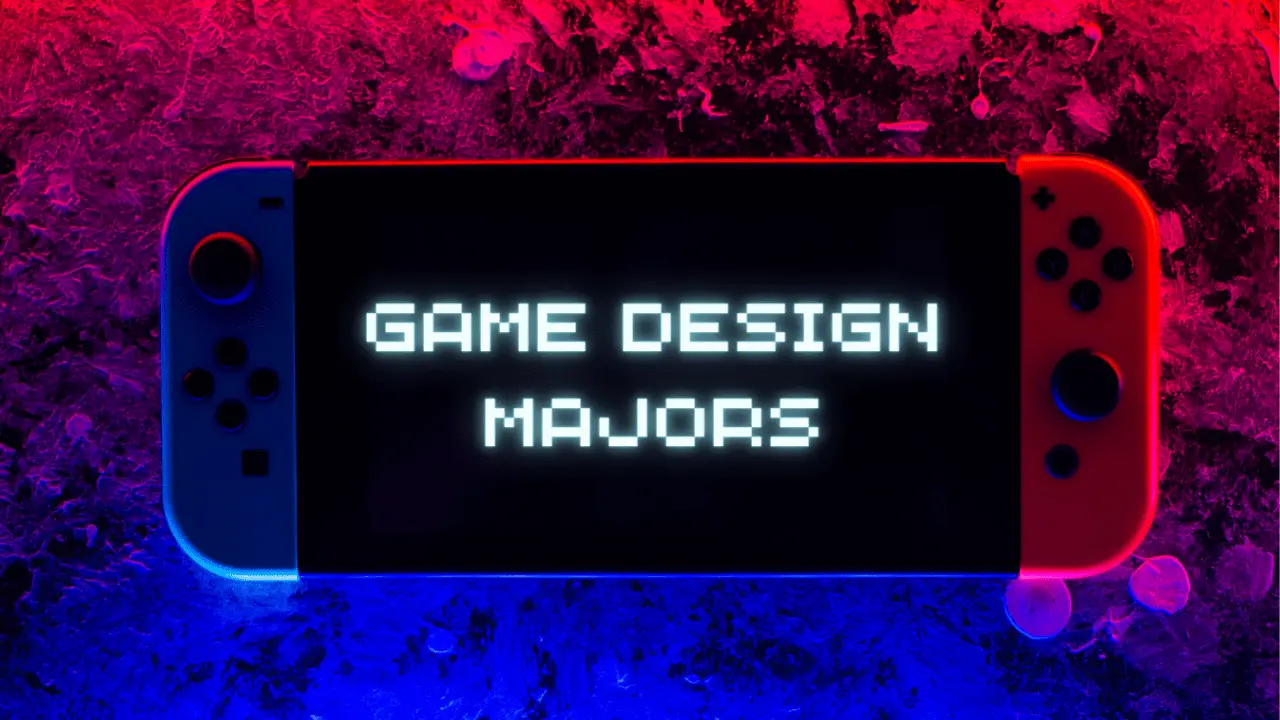What To Major In For Video Game Design
So you want to be a video game designer. That’s fantastic! You’ve got an exciting future ahead of you in a rapidly changing and advancing market. But before you choose a degree and a school, take this information into account to help you decide.
Here are some of the best majors for video game design:
- Bachelor’s Degree in Video Game Design
- Bachelor’s Degree in Computer Science
- Bachelor’s Degree in Computer Engineering
- Bachelor’s Degree in Software Engineering
- Bachelor’s Degree in Graphic Design
- Bachelor’s Degree in Digital Arts
- Bachelor’s Degree in Animation
There are three main aspects to video game development: the computer programming and coding aspect, the visual arts, and aesthetics aspect, and the phycological/invisible features aspect. Each of these is an important part of the game design process, but you are probably more excited by one of them in particular. Read on to learn about the seven bachelor’s degrees best for getting a game design job, and which aspect of game development they are strongest in.
1. Bachelor’s Degree in Video Game Design
A degree in video game design focuses on the design side of game creation. This includes 3D modeling, animation, data structures, design theory, game logic, gaming theory, graphic design, mechanics, programming languages, and digital storytelling.
Having a degree that is so specialized for your intended field could help you negotiate a better pay rate even right out of school. However, while it is more specialized for that field in particular, it isn’t specialized in a particular aspect of the field. You’ll still need to pick something to focus on within a job, and you won’t be as knowledgeable about that area as you might be if you got a degree that was more specialized in a part of the game design process.
Also, in the unlikely event that no jobs are available at the time you graduate, you won’t be able to pivot into another industry as easily.
2. Bachelor’s Degree in Computer Science 
Computer science degrees focus on the foundational skills that can be applied to a number of technological fields, including video game design. Students learn how to use computers to solve problems, process information, and provide entertainment.
This degree is less specific to game development than a degree in video game design, but it offers more flexibility in career choice. Should there be a shortage of video game design jobs available when you graduate with your degree, you can get paid just as well for working a variety of other jobs. Potential titles include but are not limited to: cloud computing engineer, database engineer, data scientist, information security analyst, mobile application designer/developer, programmer, software development, web developer.
The freedom to pivot to another career temporarily could be a significant benefit to you, since you’d have years of relevant experience in hand to negotiate a higher pay rate at your new video game design job.
This is obviously a degree focusing on the computer programing/coding aspect.
3. Bachelor’s Degree in Computer Engineering
Like a degree in computer science, this degree is an option that leaves your future career potential broader than it might be with a more gaming-specific degree. But students pursuing this degree also have the option to narrow their focus as time progresses, making them just as competitive in the game design and development job market.
Students learn about software and hardware, which gives them an advantage in knowing what computers are able to do and what their limitations are.
4. Bachelor’s Degree in Software Engineering
A software engineering degree is a bit more specific than computer engineering because it focuses on software only rather than both software and hardware. Like computer engineering, software engineering is also heavily math-based. However, there is more focus on fluency in programming languages, operating systems, and computer languages.
A software engineer’s vast knowledge of a range of different platforms makes them ideally suited to adapting games for all different systems. This includes making a mobile app version of a game that exists for PS4 only or making console versions of games that were originally made for PCs.
5. Bachelor’s Degree in Graphic Design
Graphic design is another degree that will give you a lot of career versatility, but in a different direction than computer science. Students pursuing a degree in graphic design will be able to have a career in creative directing, user experience design, user interface design, production art, product development, art directing, and marketing specializing, as well as video game designing.
A graphic designer’s job is to know all about the psychology behind the art—how art makes people feel. This is why “Marketing Specialist” is one of the job options for graduates with this degree. The graphic designer will be focused on the aesthetics as a whole rather than the stylistic details. Things like the general color tone (dark and foreboding or sunny and cheerful) of each scene, as well as of each piece of marketing material, are things the graphic designer will be in charge of. Other invisible details like these include balance, proximity, alignment, hierarchy, contrast, emphasis, proportion, and rhythm of the visuals.
They’ll also consider how old their target audience will be and therefore how old the characters should look, what tone of music should be in each scene, and even how often people should be able to find secrets and treasures as the game progresses. Psychology in regards to how each piece of the video game will make its users feel is their focus in education and their jobs.
This is the most psychologically-focused degree that can be useful for game development.
6. Bachelor’s Degree in Digital Arts 
This degree focuses on the aesthetics of a video game—how the game looks to its players in the obvious ways rather than the subconscious. This has to do with the details of the characters’ facial features and clothing, the way motion is shown, and even down to the fine details of shadows and blades of grass and water droplets.
Specific job descriptions for designers with a digital arts degree include Concept Artist, Matte Painter, Storyboard Artist, 3D Artist, Digital Painter, and Digital Illustrator. Sometimes these individuals have full freedom to decide how characters and other features of the world will look, while other times they are given specific instructions. But either way, they can imbue the worlds they create with little bits of themselves and their artistic flair if they wish.
If you have an artistic eye and enjoy adding in all the fine details to things, this could be the degree for you. Even if you aren’t able to get a job in a video game design company right off the bat, you’ll have lots of opportunities to work as an artist in other companies and gain relevant experience that you can use to negotiate for better a better rate when you do finally land that game designer job.
7. Bachelor’s Degree in Animation
While the physical movement is part of the digital artist’s job, the animation specialist is the one who will be primarily in charge of that aspect of video game development.
As an animation major, you would grow your artistic abilities by working with things like motion graphics, 2D and 3D visual effects, and video editing. You’ll also develop skills in typography, screenwriting, camera direction, pre- and post-production planning, time management, and computer literacy.
This is obviously also a degree that you could use to secure a job in television and movie production.
In this role, you would work closely with the digital arts and graphic design teams to make the movement of characters shooting and wind moving through the trees seamless and realistic.
Other Degrees for Jobs In Video Game Design
There is a wide range of master’s degrees you can acquire that have to do with video game design. Master’s in Computer Graphics and Game Technology, MFA in Game Design, MS in Game Design and Development, MA in Interactive Design and Game Development, MS in Interactive Entertainment, MFA in Media Arts, MS in Interactive Media and Game Development, MS in Serious Games, MS in Games and Playable Media, MS in Computer Science, MS in Game Science and Design, Master’s in Games Studio, MFA in Game Design, and an MA in Game Design.
Each of these degrees is very similar, so you should consider carefully what your greatest interest and priorities are before choosing which master’s degree program to go with. First, consider whether this further education will really make a difference in your career potential. What could you learn for a grade that costs you thousands of dollars that you can’t learn by putting the degree you already have to use and getting paid to do so?
While some companies will pay more right off the bat for a recent graduate with a master’s degree than they would for a recent graduate with a bachelor’s degree, many would pay more for someone holding only a bachelor’s with two years’ experience than they would for a recent grad with a master’s.
If you are determined to get a master’s degree, consider working for at least a year before choosing the degree you will pursue. Or at least take some internship opportunities or part-time job opportunities while you’re getting your bachelor’s so that you really know what you want to specialize in before getting another degree and all that extra debt.
You might also consider speaking with your current employer about whether they offer tuition reimbursement to their employees who go back to school while working for them. If you haven’t secured a job yet, be sure to ask this question in your interviews. Someone who would enable you to get a master’s degree without accruing more debt would be someone to consider working for, at least for a couple of years so that you don’t spend the next several decades paying off additional loans.
So consider whether it’s the computer programming side, the visual aesthetics side, or the behind-the-scenes psychology side of video game design that excites you the most, and then go for it. If you aren’t sure yet which is most interesting to you, consider interning or even job shadowing for a couple of days in any of the positions you can get a chance with to get an idea of what the day-to-day will really be like.
Do You Need A Degree to Become A Game Designer?
Something important you should note is that a degree is not absolutely required for video game design. While some jobs require a bachelor’s degree for a prospective employee to even be considered, many of the most famous and successful video game designers never went to college at all or got a degree in an entirely unrelated field.
Yuji Naka, who was rejected by Namco because he didn’t have a college degree, went on to found and develop the Sonic the Hedgehog games. And John Carmack, who pioneered the “first-person shooter” genre of games, dropped out of college after a couple of semesters to pursue contract computer programming jobs, which he got because he’d taught himself how to program by playing around with computers in his spare time whenever he could.
While these men may be exceptions to the rule, take heart in the knowledge that if you’d already invested in your education by learning on the job and teaching yourself whatever you can, you may still be able to get just as good a job as someone with a degree because of your experience.
If you don’t already have the experience, however, then a degree will help you get a job much more quickly than messing around with computers in your spare time will.

